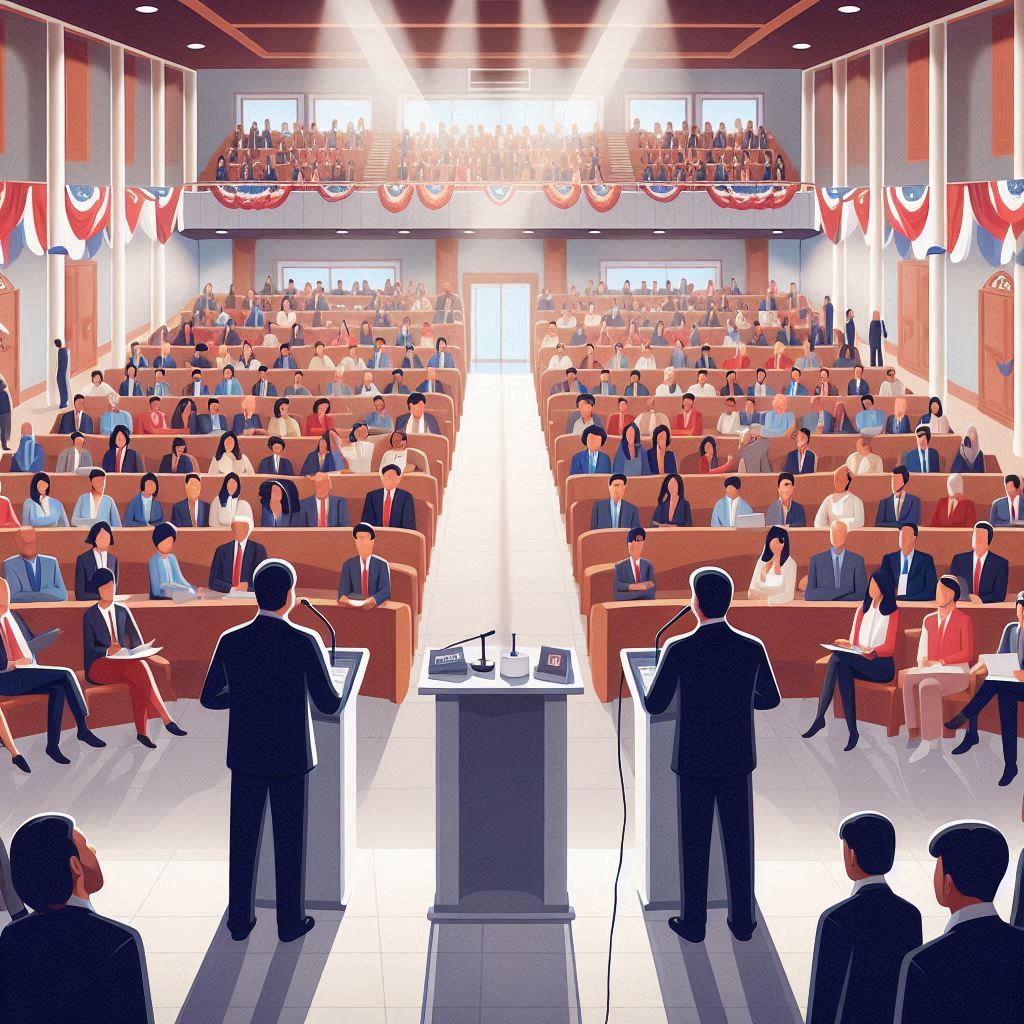2024年美國總統辯論開始,民主黨與共和黨有哪些政策差異?
美國的兩大主要政黨——民主黨和共和黨,在外交政策、國內政策、經濟政策、移民政策和墮胎政策等方面有著顯著的差異。這些差異反映兩黨在基本理念和價值觀上的分歧。
在外交政策方面,民主黨傾向於支持多邊主義,注重與國際組織和盟國合作,如聯合國和北約。重視氣候變化問題,支持《巴黎協定》和其他國際環保協議。此外,民主黨強調人權外交,支持在全球推廣民主和人權,並在處理國際衝突時較為謹慎,偏向於外交解決。然而,當需要時,他們也不排除使用軍事力量。相比之下,共和黨更傾向於單邊主義,強調美國的主權和獨立行動的權利。他們支持增加國防預算,強調軍事力量的重要性,在國際事務中更加重視經濟利益和國家安全,而較少強調氣候變化和人權。共和黨相比民主黨更容易支持軍事干預和強硬的外交政策。
在國內政策上,民主黨支持擴大社會福利計劃,如全民醫保和教育資助等。他們推動更嚴格的槍支管控法律,以減少槍支暴力,同時強調環保,推動可再生能源和減少碳排放。此外,民主黨支持刑事司法改革,減少對非暴力犯罪的刑期,並推動警察改革。另一方面,共和黨主張小政府,減少政府干預和公共開支,強調個人責任。他們支持第二修正案,反對嚴格的槍支管控法律,並支持化石燃料的開採和使用,反對過多的環保法規。共和黨強調法律與秩序,支持嚴格執法和更嚴厲的刑罰。
在經濟政策方面,民主黨支持進步稅制,主張對富人和大企業增稅,以資助社會福利和公共服務。他們支持工會,推動提高最低工資和加強工人權益保護,同時支持政府在基礎設施、教育和科技方面的投資,以促進經濟增長。共和黨則主張減稅,特別是對企業和富人的減稅,以刺激經濟增長和投資。他們強調自由市場經濟,反對過多的政府干預和監管,並注重減少小企業的稅負和監管,鼓勵創業和經濟活力。
在移民政策上,民主黨支持綜合性移民改革,推動為非法移民提供合法身份的途徑,對難民和庇護申請者較為友好,希望擴大接收難民數量。他們支持家庭團聚政策,促進移民家庭的團聚。共和黨則強調邊境安全,支持修建邊境牆和增加邊境巡邏,主張嚴厲打擊非法移民,反對為非法移民提供合法身份途徑。他們支持控制合法移民的數量,優先考慮基於技能的移民政策。
在墮胎政策上,民主黨支持女性的墮胎權利,強調女性應該有權選擇是否進行墮胎,並支持維持1973年的羅訴韋德案(Roe v. Wade)裁決,保障墮胎的合法性。他們推動全面的性教育和避孕措施,以減少意外懷孕的發生。共和黨則反對墮胎,認為生命從受孕開始,應該受到保護。支持對墮胎設置更多限制,如等待期、父母通知和對晚期墮胎的禁令,並推動法律和政策來保護未出生嬰兒的生命權。
總體來看,民主黨和共和黨在外交政策、國內政策、經濟政策、移民政策和墮胎政策等主要議題上存在顯著差異。理解這些差異有助於更好地認識美國政治和政策走向。
Major Differences Between the Democratic and Republican Parties
The two major political parties in the United States, the Democratic Party and the Republican Party, have significant differences in their policies on foreign affairs, domestic policies, economic policies, immigration policies, and abortion policies. These differences reflect the divergent philosophies and values of the two parties.
In terms of foreign policy, the Democratic Party tends to support multilateralism, emphasizing cooperation with international organizations and allies such as the United Nations and NATO. They prioritize addressing climate change issues, supporting the Paris Agreement, and other international environmental agreements. Additionally, Democrats emphasize human rights diplomacy, advocating for the promotion of democracy and human rights worldwide. They are generally more cautious about military intervention, preferring diplomatic solutions to international conflicts, but do not rule out the use of military force when necessary. In contrast, the Republican Party leans towards unilateralism, stressing the importance of American sovereignty and the right to act independently. They advocate for increased defense spending and emphasize the significance of military strength. Republicans prioritize economic interests and national security in international affairs, placing less emphasis on climate change and human rights. They are more likely to support military interventions and adopt a tough stance in foreign policy compared to Democrats.
On domestic policy, Democrats support the expansion of social welfare programs such as universal healthcare and educational funding. They push for stricter gun control laws to reduce gun violence, and they emphasize environmental protection by promoting renewable energy and reducing carbon emissions. Additionally, Democrats advocate for criminal justice reform, aiming to reduce sentences for non-violent offenses and promote police reform. On the other hand, Republicans advocate for limited government, reducing government intervention and public spending, and emphasizing personal responsibility. They support the Second Amendment and oppose strict gun control laws. Republicans favor the development and use of fossil fuels and oppose excessive environmental regulations. They stress law and order, supporting strict enforcement and harsher penalties.
In economic policy, Democrats support a progressive tax system, advocating for higher taxes on the wealthy and large corporations to fund social welfare and public services. They support labor unions, push for higher minimum wages, and enhance worker rights protections. Democrats also back government investments in infrastructure, education, and technology to stimulate economic growth. Conversely, Republicans advocate for tax cuts, particularly for businesses and the wealthy, to stimulate economic growth and investment. They emphasize a free-market economy, opposing excessive government intervention and regulation. Republicans focus on reducing tax burdens and regulations on small businesses, encouraging entrepreneurship and economic vitality.
Regarding immigration policy, Democrats support comprehensive immigration reform, promoting pathways to legal status for undocumented immigrants. They are more welcoming towards refugees and asylum seekers, advocating for increased refugee intake. Democrats support family reunification policies, facilitating the reunion of immigrant families. Republicans, however, emphasize border security, supporting the construction of border walls and increased border patrols. They advocate for strict measures against illegal immigration and oppose pathways to legal status for undocumented immigrants. Republicans support controlling the number of legal immigrants, prioritizing a skill-based immigration system.
On abortion policy, Democrats support women's right to choose and emphasize that women should have the autonomy to decide whether to have an abortion. They support maintaining the 1973 Roe v. Wade decision, which ensures the legality of abortion. Democrats advocate for comprehensive sex education and access to contraception to reduce unintended pregnancies. Republicans, on the other hand, oppose abortion, believing that life begins at conception and should be protected. They support imposing more restrictions on abortion, such as waiting periods, parental notification, and bans on late-term abortions. Republicans promote laws and policies that protect the rights of unborn children.
Overall, the Democratic and Republican parties have significant differences in their policies on foreign affairs, domestic policies, economic policies, immigration policies, and abortion policies. Understanding these differences helps in gaining a better insight into the political and policy directions in the United States.



照片:DALLE3
- 1
- 2
- 3
- 4
